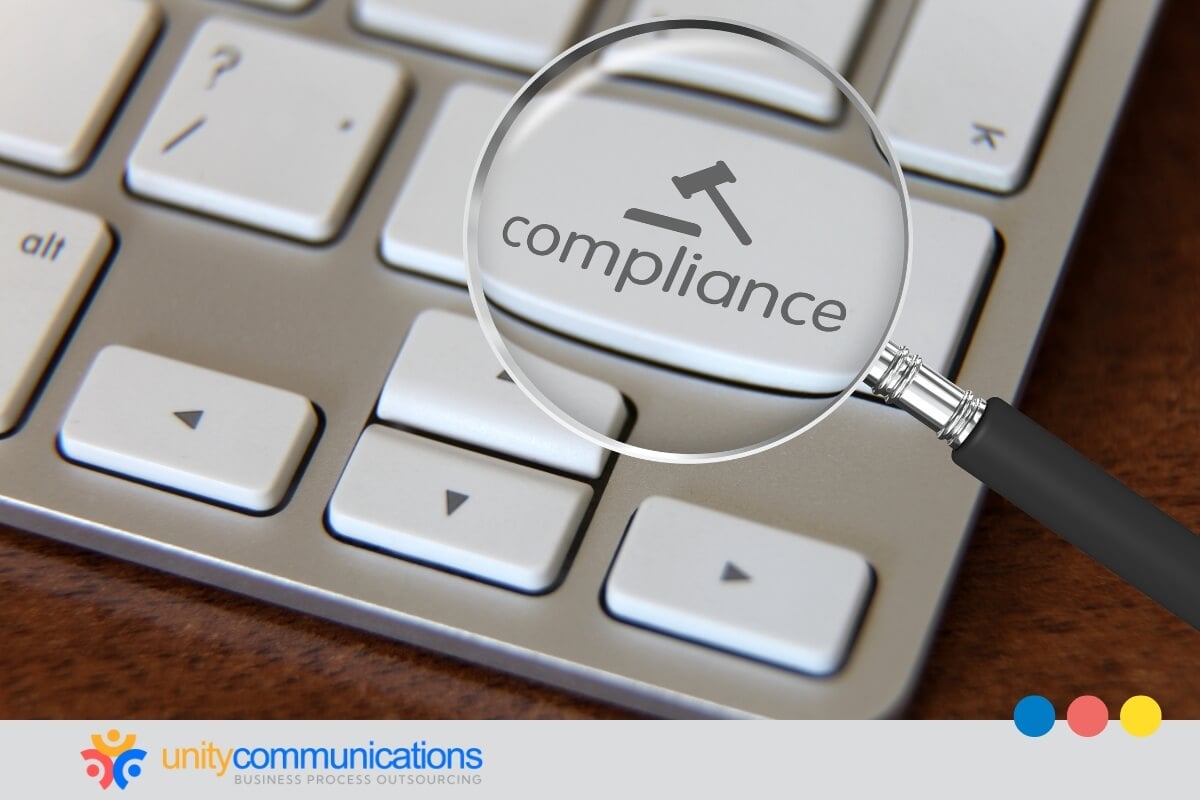Table of Contents
Employer of record (EOR) services are essential in ensuring multinational enterprises are compliant with local labor laws.
This article examines the significant roles of EOR providers in negotiating challenging employment rules. It emphasizes their value in overseeing job practices, policies, and processes to maintain adherence to local legal requirements.
From compliance oversight to benefits administration and legal support provision, EOR offers comprehensive solutions to help businesses navigate regulatory landscapes effectively while fostering a legally sound workplace environment.
Keep reading to learn about its benefits!
Why compliance with local labor laws is crucial

EOR services entail a third-party provider functioning as a worker’s legal employer. It manages payroll and other human resources (HR) functions and deploys staff members to a client company to fulfill required tasks.
A type of third-party provider that offers EOR services is a business process outsourcing (BPO) company. It can also supply client firms with standard outsourced operations such as call centers, help desks, information technology (IT) support, and data entry services.
Among the vital functions of the EOR service provider is ensuring compliance with local labor laws for its client organizations. It specializes in navigating regulatory demands. Here are some reasons companies must adhere to employment regulations in the countries where their outsourced personnel reside:
- Top talent. Law-abiding businesses attract qualified professionals by upholding ethical standards, respecting labor rights, enhancing recruitment, and expanding the talent pool.
- Positive reputation and brand image. Compliance enhances a company’s reputation. It garners customer, investor, and stakeholder trust and loyalty by showcasing its integrity, responsibility, and social accountability.
- Reduced turnover rates. Labor law compliance boosts retention by fostering worker security and well-being, lowering attrition costs, and improving organizational stability.
- Stakeholder confidence. Compliance with labor laws instills confidence in investors, suppliers, and regulators. It helps establish the business’s reliability and trustworthiness for long-term partnerships.
Key roles of EOR services in local labor law compliance

EOR guarantees conformity to specific labor regulations in many jurisdictions. Service providers handle all employment operations while following each location’s regulatory requirements. Below, we outline the critical role of EOR services in ensuring compliance with local labor laws.
Legal compliance oversight
The EOR certifies all employment practices and maintains compliance through their expert knowledge of local labor laws and regulations, reducing the client’s legal risks.
Here’s how EOR service providers oversee legal compliance:
- Comprehensive legal compliance review. EORs review employment practices and policies to align with local labor laws. They examine recruitment, contracts, classification, payroll, benefits, and termination. By identifying and rectifying violations, EORs mitigate legal risks for clients.
- Continuous monitoring and updates. EOR service providers vigilantly monitor local labor laws, promptly informing clients when a policy, procedure, or contract update is due. This proactive approach minimizes the legal risks associated with non-compliance.
- Effective onboarding and offboarding. BPO firms offering IT support outsourcing and similar operations ensure that the onboarding and offboarding processes follow proper documentation, tax filing, and employee notifications.
Regulatory compliance assurance
Third-party specialists understand the intricate nuances of local regulations. Examine how EOR providers ensure compliance with local labor laws through their expertise in area-specific regulations:
- Legal investigation and analysis. EOR service providers conduct considerable technical studies and evaluations to translate labor laws accurately so that client companies understand their rights and duties under local rules.
- Comprehensive training programs. EORs thoroughly educate employees and clients about employment contracts, wages, benefits, and termination processes.
- Localized knowledge. With a presence in several geographic regions, EOR providers utilize localized knowledge of labor laws and adjust their compliance tactics to each jurisdiction’s unique requirements.
Legal contract drafting
EORs draft tailored employment contracts that comply with local requirements regarding wages, working hours, benefits, and termination provisions.
Uncover how EOR services tailor employment contracts to maintain compliance with local labor laws:
- Straightforward compensation terms. EORs specify clear terms regarding employee compensation in employment contracts, outlining salary, bonuses, commission structures, and applicable benefits or allowances.
- Clear termination procedures. EORs outline clear procedures and requirements for termination in employment contracts, including notice periods, severance pay, and any legal obligations stipulated by local regulations.
- Strict adherence to working hours rules. EOR providers incorporate provisions in employment contracts that comply with local laws governing working hours, including maximum limits, rest periods, and overtime compensation where applicable.
Payroll compliance
Third-party providers can also manage payroll processes. EOR services ensure accurate and timely employee payment while complying with legal obligations, such as local tax and labor laws, deductions, and contributions.
Look into how EOR services ensure proper payroll management.
- Precise calculation of withholdings. EORs meticulously calculate employee withholdings for income tax, social security contributions, healthcare, and other relevant tax obligations.
- Accurate payroll processing. EORs leverage advanced payroll software to process compensation accurately and efficiently, minimizing errors and discrepancies in employee payments.
- Timely payment disbursement. EORs guarantee that wages, bonuses, and commissions are paid on time and according to local rules and pay frequency requirements.
- Minimum wage law compliance. BPO enterprises abide by minimum wage guidelines by ensuring every worker’s earnings surpass the legally specified lowest pay rates established by local authorities.
Classification compliance oversight
EORs assist in correctly classifying employees and distinguishing between full-time, part-time, temporary, and independent contractor statuses to prevent misclassification risks.
Check how EOR services assure correct employee classification to uphold compliance with local labor laws:
- Clear distinction between categories. EORs decrease the potential for misclassification by establishing differences between full-time, part-time, temporary, and independent contractor positions.
- Detailed documentation. EORs help clients create documentation and policies outlining criteria for each employment classification category, ensuring consistency and transparency in classification practices.
- Thorough assessment of employment relationships. EOR providers assess the nature of employment relationships to determine appropriate classification, considering factors such as supervision and integration into the client’s operations.
- Strategic risk analysis and mitigation. EORs undertake risk assessments to detect possible misclassification hazards and then apply mitigation techniques to assure compliance with local requirements.
Immigration compliance facilitation
EORs help overseas employees get work permits and visas. Scrutinize how EOR services secure these documents while maintaining compliance with immigration rules and local labor laws:
- Initial assessment. EOR providers first assess international employees’ eligibility for work permits and visas, considering factors such as job role, qualifications, and country-specific requirements.
- Complete documentation guidance. EORs assist overseas employees with the papers needed for visa and work permit applications, ensuring that every required form is completed and accurate.
- Proper application preparation. EORs assist in compiling necessary documents, including contracts, certificates, and medical insurance, and submitting visa and work permit applications to relevant immigration authorities.
- Official liaison with authorities. Third-party providers are liaisons between overseas employees and immigration authorities. They enable communication and respond to questions or requests throughout the application process.
Benefits compliance administration
EORs manage employee benefits, including healthcare, retirement plans, and insurance. Evaluate how EOR services ensure compliance with local labor laws by administering employee benefits to eligible workers:
- Customized benefit packages. EORs customize benefit packages to align with each jurisdiction’s regulations and employee preferences.
- In-depth eligibility analysis. Service providers conduct eligibility assessments to determine which employees are entitled to benefits based on local mandates and employment contracts.
- Assisted enrollment. EORs help workers enroll for healthcare, retirement programs, and insurance, ensuring timely and accurate enrollment procedures.
- Vendor management. Third-party EORs oversee benefits vendor relationships, negotiate contracts, and ensure compliance while managing benefits administration for clients.
- Claims management. EORs manage healthcare and insurance claims, aiding employees with submissions and ensuring timely processing and reimbursement.
Leave management compliance
EOR services include handling vacation, sick leave, maternity and paternity leave, and other approved time off provided to employees.
Here’s how EOR services ensure client’s leave management is compliant with local labor laws:
- Accurate tracking. EORs implement robust leave tracking systems to accurately monitor employee leave balances, usage, and compliance with local regulations regarding accrual rates, carryover limits, and usage restrictions.
- Correct leave entitlement calculation. BPO organizations compute employee leave entitlements following local regulations, factoring in criteria such as length of service, job status, and any statutory rights prescribed by the jurisdiction.
- Strong adherence to notice requirements. EORs enforce leave notice requirements per local regulations to prevent disputes and ensure timely employee and employer processing.
- Specific circumstance accommodation. EORs address extraordinary situations under local law, such as personal emergencies and other statutory entitlements.
Policy development compliance
EOR services aid in developing HR policies and procedures that comply with local labor laws, covering areas such as harassment prevention, discrimination, and workplace safety.
Delve into how EOR providers oversee HR policy development.
- Tailored procedures. EORs customize HR policies to address specific legal requirements and organizational needs, considering factors such as industry, workforce demographics, and business objectives.
- Enforced harassment prevention policies. BPO companies develop robust harassment prevention policies that align with local laws, outlining prohibited behaviors, reporting procedures, investigation protocols, and disciplinary actions.
- Implemented discrimination rules. EORs issue discrimination policies that follow local laws, promote workplace diversity and inclusion, and prevent prejudice based on various protected characteristics.
- Workplace safety protocols. BPO partners implement guidelines that address or surpass regulations, including hazard identification, accident reporting, emergency response, and employee safety training.
Legal support provision
EOR services provide ongoing legal compliance support and updates on local labor law amendments, ensuring employers remain informed and proactive about evolving regulations.
The following are ways EOR services provide ongoing legal assistance:
- Regular updates. EOR service providers continuously monitor changes to local labor laws, providing clients with timely updates on legislative amendments, rules, and compliance requirements.
- Legal consultation. BPO firms offer legal consultation to clients. They clarify complex legal matters, interpret regulations, and recommend compliance strategies.
- Customized alerts. Third-party vendors send dedicated alerts and notifications to clients regarding changes to local labor laws that might impact their operations, ensuring proactive compliance management.
- Legal representation. Service providers protect clients’ interests by offering representation in legal disputes, investigations, or audits related to local labor laws.
The bottom line

Partnering with the right EOR service provider, such as a reputable BPO company, guarantees smooth compliance with local labor laws. This collaboration ensures meticulous employment practices and policy management, aligning with regulatory requirements to minimize legal risks and promote harmony.
A trustworthy BPO provider’s skills and experience enable businesses to successfully manage complex laws and focus on their core activities.
Let’s connect if you want to learn more about how we can help you fulfill your EOR needs and achieve seamless compliance with local labor laws.



